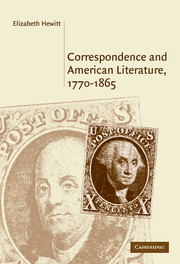2 - Emerson and Fuller's phenomenal letters
Published online by Cambridge University Press: 22 September 2009
Summary
In “Politics,” Emerson describes the young nation's preference for democracy as only provisional, explaining, “Democracy is better for us, because the religious sentiment of the present time accords better with it.” This refusal to embrace as inevitable the political system under whose name the nation (at least ideally) had been founded is an example of Emerson's characteristic contrariness – a provocative stance against the tendency to be “very vain of our political institutions.” Here speaking as the radical (even anarchical) Emerson, he announces that “Every actual State is corrupt,” and the nature of this corruption is particularity of interests. His denunciation of political systems is actually an invocation of civic virtue: the problem with politics is that private and personal interests contaminate ideal “instincts.” In similar terms, Emerson repeatedly references the “colossal ugliness in the governments of the world,” which is force. And force, as Emerson defines it, is the exertion of the self-interest of those who hold power (the state) over those who don't (its citizens). If his attack on self-interest is consonant with republicanism, then, in declaring the state to be fundamentally “corrupt,” Emerson also speaks the essential tenet of liberalism. Because the power of the state is always understood to be a diminishment of individual autonomy, or freedom, the emphasis must be on limiting its power. In these terms we can see that the only distinction between liberalism and anarchy is that the liberal understands the state as a necessary evil.
- Type
- Chapter
- Information
- Correspondence and American Literature, 1770–1865 , pp. 52 - 82Publisher: Cambridge University PressPrint publication year: 2004

